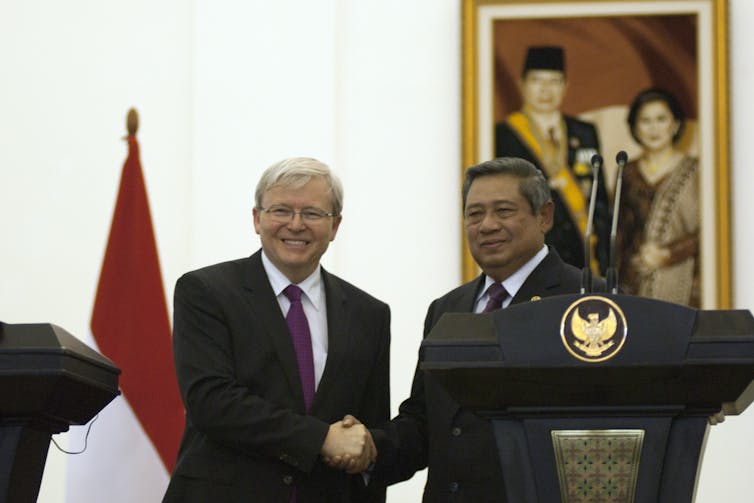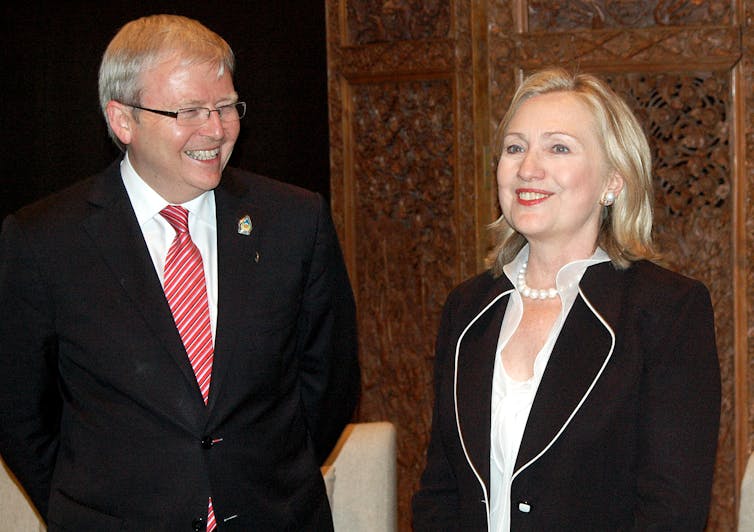
Most of the commentary about Kevin Rudd since his resignation has focused on his domestic impact and the internecine power struggles that were such a feature of his time in politics. Understandable as this may be, it misses what may well be the greater long-term significance of his time in office: he may prove to be the last Australian prime minister who believes this country can make a difference internationally.
Although members of the Abbott government continue to invoke the language of “middle power diplomacy”, their hearts plainly aren’t in it. The failure of any government minister to turn up for the UN’s potentially important discussions of climate change policy in Warsaw is currently Exhibit A in support of this contention as far as the growing band of critics are concerned.
Whatever you think about the possibility of achieving change in this area, as tangible expressions of government thinking and priorities are concerned, it’s pretty revealing. The contrast with the ALP in this regard is striking. Ever since Labor’s former hyperactive foreign minister Gareth Evans quite literally wrote the book on it, middle power activism has been a central plank of ALP foreign policy.
What distinguished the first Rudd government in particular was the scale of the ambition and the apparent belief that Australia could actually make a difference in determining big international initiatives. Middle powers, Rudd thought, really could “punch above their weight” in precisely the way Evans had always argued.
In Evans’ case, there was actually some fairly persuasive supporting evidence for this thesis. Whether it was establishing the Cairns group of like-minded, pro-market agricultural producers, or encouraging the development of what became the ASEAN Regional Forum, Australian ideas and initiatives really did seem to make a difference at times.
Both the difficulty of the issues and the quality of the diplomatic effort meant that the Rudd government struggled to have the same sort of impact. Rudd’s “Asia Pacific Community” idea was quietly buried when it became painfully obvious that there was little enthusiasm on the part of Australia’s notoriously sensitive neighbours who didn’t take kindly to being cajoled by pushy non-Asians.
Even more telling and politically damaging was Rudd’s failure at the climate conference in Copenhagen. The words “climate change” and “moral challenge” will be forever synonymous with Rudd and unmet expectations. It’s easy to be wise in hindsight, of course, but ramping up the rhetoric and expectations over an issue as notoriously resistant to resolution as climate change never looked like smart politics.
A more subtle, but equally damaging threat emerged from “Australia’s” overwhelmingly foreign-owned resource sector. Most Australians would probably not even consider this to be a foreign policy problem, but the mining sector’s highly effective campaign against the Minerals Resource Rent Tax further undermined Rudd’s credibility in the eyes of a surprisingly fickle public.

The net consequence of this period as far as domestic public policy is concerned is probably to have made governments of all persuasions leery of getting involved in a stoush with powerful vested interests, especially from overseas. Much easier to leave it to the market, whether this means allowing contentious investments in the agricultural industry or withdrawing assistance in the manufacturing sector.
In the more traditional foreign policy arena the limits to government ambition and capacity are even starker. Unfortunately, there don’t seem to be too many areas in which a self-respecting middle power can make much of a difference by providing innovative solutions to international collective action problems. The failure to reach any sort of agreement on climate change will no doubt reinforce the Abbott government’s skepticism about the possible effectiveness and goals of international cooperation.
Whatever history ultimately makes of Rudd, he can’t be faulted for lack of ambition. True, there were questions about style, priorities and pragmatic follow-through. But at a time when one of the principal criticisms of contemporary political leaders is that they fail to tackle important issues, at least he tried. It may be that Australia can have little impact on key issues, such as climate change, but there’s only one way to be sure.
This may seem like faint praise, but it’s worth asking what we want our foreign policymakers to do — especially when they come from modestly credentialed countries, such as Australia. We may be about to experience a multi-year master class in the politics of the parochial. There may not always be votes in foreign policy and what Paul Keating used to call the “big picture”, but there’s not much point in being a leader if you don’t have some sort of vision.
As no less a foreign policy expert than Oscar Wilde famously observed, a map of the world without Utopia on it is not worth looking at.
